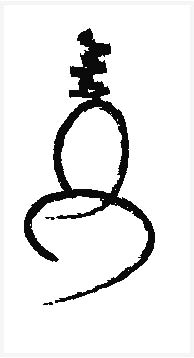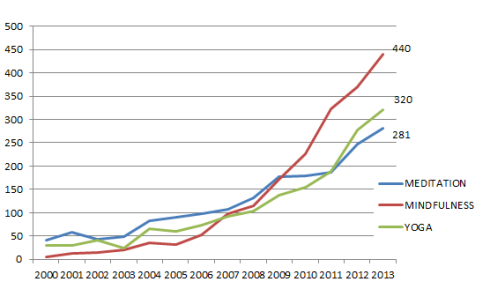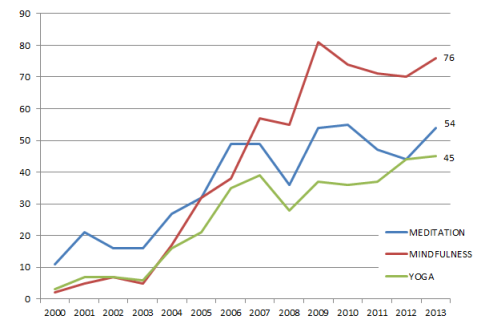Are you wondering what are the most recent, relevant, and significant research findings concerning Mindfulness, Meditation, and Contemplative practice? Well…..Here is the place for you to find out. Two great resources available online are
1. Institute for Noetic Sciences (IONS) [Link]
2. Mindfulness Research Guide [Link]
3. Contemplative Neuroscience Research – ScoopIt page – [Link]
4. Institute for the Biocultural Study of Religion [Link]
POPULAR PRESS:
The graph above represents the number of peer-reviewed publications as referenced by PubMed (through 2013). PubMed is a division of the US National Library of Medicine and the National Institute of Health.
The graph above represents the number of grants awarded by the NIH through 2013 based on the RePORTER database. RePORTER indexes data and analyses of NIH research activities.
If there is a topic of interest, a specific contemplative scientist, or concept, type it in the search area on the home page of Contemplative Mind in Life [Link] and I am likely to have some information herein. If not, feel free to post a comment, and I’ll be happy to find out more detail or address it personally.
With Metta,
Dave

Leave a Reply
You must be logged in to post a comment.



8 Responses
Hello, My name is Lee Yule, iam studying Psychology at Birkbeck University London. I am currently researching for my final year project and am interested in the effects of mediatation on attention, in particular deautomization of attentional responses. I am looking for a psychological test other than a stroop test that measures habitual responses. Any advice on research in this area or a possible test would be great.
Kind regards
Lee
Lee,
Attention and working memory appear to be the constructs you should be investigating through literature searches. There are plenty of search engines out there to do literature searches for what you are interested in:
pubmed: http://www.apa.org/psycinfo/
psycinfo: http://www.apa.org/psycinfo/
one task that comes to mind is the Sustained Attention Response Task (SART): http://www.mrc-cbu.cam.ac.uk/panel/experiments/sart/
good luck,
Dave
I would like to bring your attention to the Solloway Mindfulness Survey at http://www.devtestservice.org The SMS is offered free to teachers and their students. Teachers can download their students’ SMS measures in order to monitor growth in mindfulness. The SMS also has a journaling function so that students can reflect on their mindfulness experiences and get feedback from their teachers. The journal data can also be downloaded by the teachers. Students have access to their individual measures and their journal dialogues with their teachers.
The SMS has been rigorously tested with a statistical reliability of .94. The SMS pages provide peer-reviewed articles describing the development of the SMS.
SMS items are based on the journal entries of mindfulness students who commented on their (1) ability to experience a state of intentional attention—paying attention on purpose, with curiosity, kindness, openness, and a non-judgmental attitude, and (2) associated experiences, such as new insights, new connections and changes in their experience of time. The SMS measures the effects of intentional attention: (1) the experience of intentional attention itself, and (2) the results of intentional attention. Because the statistical reliability of the SMS is high (.94 or higher), it can be used to monitor the progress of individual students as well as groups.
Narrative descriptions of mindfulness practice accompany SMS measures. The narrative for each measure has three parts: Description of mindfulness practice at that level, a representative journal entry of a student at that level, and suggestions for the stage in Alan B. Wallace’s book, The Attention Revolution: Unlocking the Power of the Focused Mind, a person at that measure most likely would benefit in order to continue growing in mindfulness practice. You can see these narrative descriptions at the bottom of the “Teacher Information” page (http://www.devtestservice.org/mindfulness/m-teacherinfo.php).
All SMS resources are offered free for mindfulness teachers and students. Researchers may use the SMS and journal functions with data download access for a nominal fee.
Thanks Sharon. I enjoyed your talk at the last Center for Mindfulness Conference. Will be sure to pass the word on re: SMS
Nice post. I study one thing more difficult on totally different blogs everyday. It would at all times be stimulating to read content material from other writers and observe a bit of one thing from their store. I’d desire to make use of some with the content material on my weblog whether or not you don’t mind. Natually I’ll give you a link on your net blog. Thanks for sharing.
I would like to bring your attention to the Solloway Mindfulness Survey at http://www.devtestservice.org The SMS is offered free to teachers and their students. Teachers can download their students’ SMS measures in order to monitor growth in mindfulness. The SMS also has a journaling function so that students can reflect on their mindfulness experiences and get feedback from their teachers. The journal data can also be downloaded by the teachers. Students have access to their individual measures and their journal dialogues with their teachers.
The SMS has been rigorously tested with a statistical reliability of .94. The SMS pages provide peer-reviewed articles describing the development of the SMS.
SMS items are based on the journal entries of mindfulness students who commented on their (1) ability to experience a state of intentional attention—paying attention on purpose, with curiosity, kindness, openness, and a non-judgmental attitude, and (2) associated experiences, such as new insights, new connections and changes in their experience of time. The SMS measures the effects of intentional attention: (1) the experience of intentional attention itself, and (2) the results of intentional attention. Because the statistical reliability of the SMS is high (.94 or higher), it can be used to monitor the progress of individual students as well as groups.
Narrative descriptions of mindfulness practice accompany SMS measures. The narrative for each measure has three parts: Description of mindfulness practice at that level, a representative journal entry of a student at that level, and suggestions for the stage in Alan B. Wallace’s book, The Attention Revolution: Unlocking the Power of the Focused Mind, a person at that measure most likely would benefit in order to continue growing in mindfulness practice. You can see these narrative descriptions at the bottom of the “Teacher Information” page (http://www.devtestservice.org/mindfulness/m-teacherinfo.php).
All SMS resources are offered free for mindfulness teachers and students. Researchers may use the SMS and journal functions with data download access for a nominal fee.
+1
This is a really beneficial study for me, Must admit that you are amid the very most excellent bloggers I ever saw.Thanks for posting this informative article.
Hello! I just would like to give a huge thumbs up for the great info you have here on this post. I will be coming back to your blog for more soon.